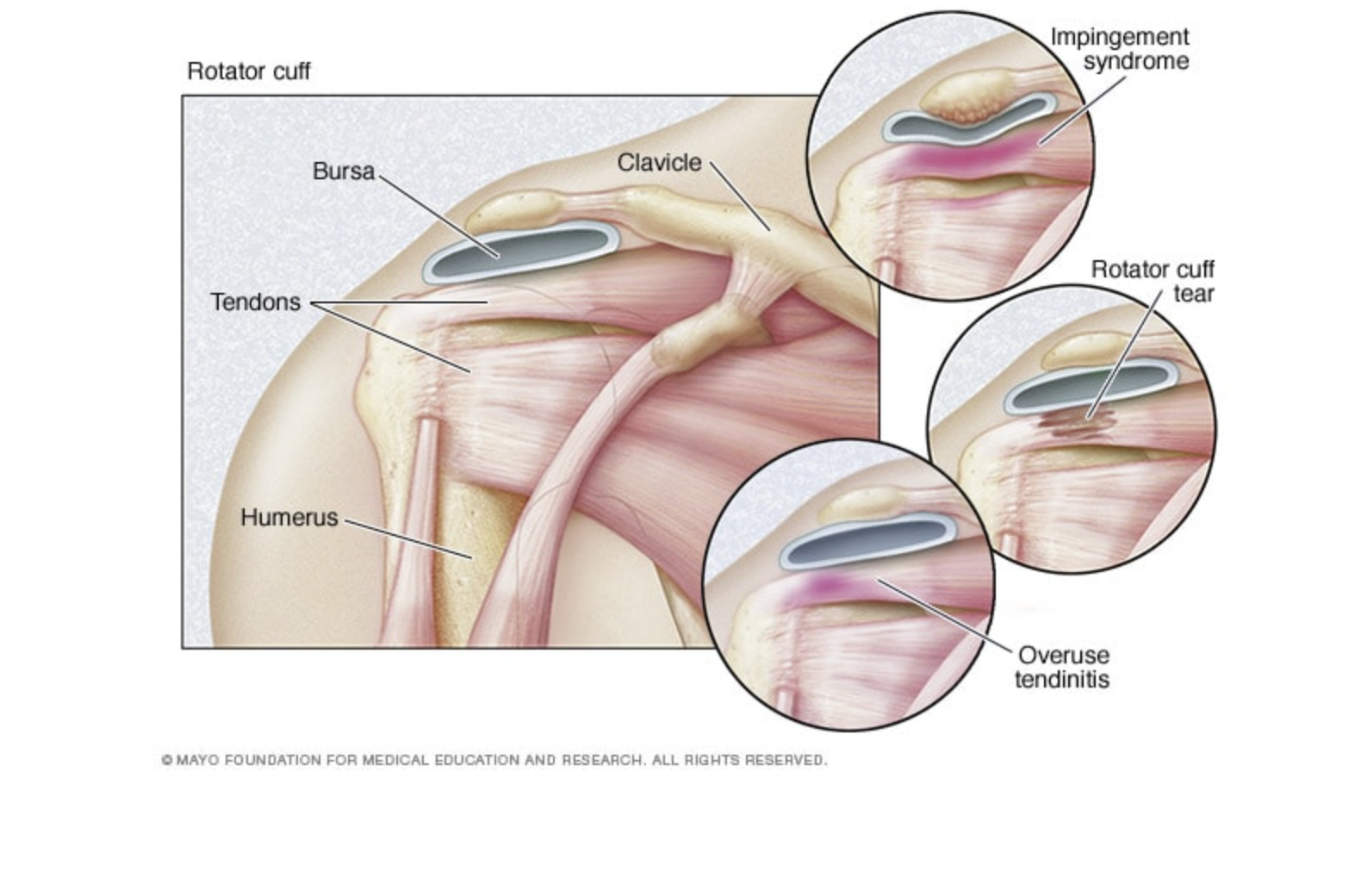The rotator cuff is an important structure of the shoulder that is often subject to injury. Depending on the severity of the injury, different types of rotator cuff repairs may be necessary. According to a case study, there has been a large increase in rotator cuff repairs in the last decade. The study shows that the number of open repairs went up by 21%, while arthroscopic repairs skyrocketed by 530%.
In this blog, we’ll go over the different types of rotator cuff repairs and how they can help restore the shoulder’s range of motion.
What is a Rotator Cuff?
A rotator cuff is a group of four muscles and their tendons that work together to provide stability and movement to the shoulder joint, and allow for a wide range of motion.
The rotator cuff muscles include the supraspinatus, infraspinatus, teres minor, and subscapularis. These muscles are responsible for controlling the rotation and abduction of the shoulder joint. These muscles originate from different locations around the shoulder blade and attach to the humerus.
When the rotator cuff is injured or damaged, it can cause pain, weakness, and limited range of motion in the shoulder.

Types of Rotator Cuff Repairs
When rotator cuff muscles and tendons become injured, it can limit movement and cause pain. Fortunately, there are several types of rotator cuff repairs that can help restore strength and range of motion to the shoulder joint.
-
Open Repair
This procedure requires a larger incision to access the shoulder joint. The surgeon then removes any damaged tissue and repairs any tears. This technique is more invasive than arthroscopic repair and may require a longer recovery time.
-
Arthroscopic Repair
This procedure is done through a small incision and a camera is used to view the inside of the joint. The surgeon then removes any damaged tissue and repairs any tears. This is a minimally invasive technique that can help restore range of motion and strength to the shoulder.
-
Mini-Open Repair
This process is a minimally invasive surgical procedure used to repair damaged tendons or ligaments in the shoulder. It involves making a small incision, less than 2 inches, and using specialized tools to repair the damaged tissue. The procedure is less invasive than traditional open surgery, and the recovery time is shorter.
No matter which type of rotator cuff repair is chosen, the goal is to restore range of motion and strength to the shoulder joint. The best type of repair for each individual will depend on the severity of the injury and the patient’s overall health.
Choosing the Right Repair
Choosing the right rotator cuff repair is a critical decision that can make a big difference in the outcome of your surgery. It is important to understand the different types of repairs available and the risks associated with each one.
Here are some factors that your surgeon will consider when making an informed decision about which repair is best for you.
- Consider the size and shape of the tear. Small tears may be treated arthroscopically, while larger tears may require open surgery.
- Consider the location and extent of the tear. Some locations may require more intensive repair than others.
- Discuss the benefits and risks with your doctor to understand potential outcomes.
- Understand the recovery process. Different repairs need different care and recovery times, so know what to expect.
- Talk to your doctor about the timeline and activities to avoid during recovery.
- Consider the post-surgical rehabilitation program—follow-up visits/therapy etc.
Choosing the right rotator cuff repair is an important decision your surgeon will make for you, but with the right information and guidance, a well-informed choice between you and your surgeon will be made that will help ensure the best outcome for your surgery.
When is Rotator Cuff Surgery Recommended?
Rotator cuff surgery is most commonly recommended when more conservative treatments, such as rest, physical therapy, and occasionally steroid injections, have failed. It is often suggested for those with a rotator cuff tear, shoulder impingement, or bursitis.
Other signs that may indicate surgery is a viable option for you include:
- You are experiencing severe pain, limited range of motion, and muscle weakness.
- You have a substantial sized tear and the tendon tissue in the vicinity is healthy.
- Your shoulder has experienced considerable debilitation and loss of mobility.
- Your tears were the result of a recent, sudden injury.
When you visit your doctor, they will use different imaging tests such as MRI, X-ray, and sometimes ultrasound to determine the extent of damage to your rotator cuff.
When to Seek Treatment for Rotator Cuff Repair?
If you are experiencing any of the symptoms described above, it is important to seek treatment for rotator cuff repair as soon as possible to reduce the risk of further damage and to get you back to full strength and range of motion. If you wait too long to be evaluated, or wait too long after injury, the tear may not be repairable.
South Florida International Orthopedics has one of the best shoulder specialists in Miami who will help you determine the best course of treatment for your condition. Treatment can involve physical therapy, medications, and surgery. Our Miami orthopedics specialists are the experts in treating all kinds of musculoskeletal conditions, from the most complex to the most common, including sports medicine.
With our help, you can get back to living a full and active life. Start your treatment today! Contact us at
(305) 233-0011 or request an appointment.
***
The material contained on this site is for informational purposes only and DOES NOT CONSTITUTE THE PROVIDING OF MEDICAL ADVICE, and is not intended to be a substitute for independent professional medical judgment, advice, diagnosis, or treatment. Always seek the advice of your physician or other qualified healthcare providers with any questions or concerns you may have regarding your health.
